Rice: Research to Production - 2007 Course Participants

Jillian Blair
Contact Information
Jillian BlairMS Student (Plant Science)
Florida A&M University
Source of Funding: National Science Foundation (NSF)
Course highlights
Most of the information presented in this course was new information to me. So the highlight of the course was the learning experience. I especially enjoyed the crop establishment, land preparation and emasculation exercises. But I learned the most from management, post-harvest management and the social science workshops. My most outstanding point was working and learning in such a diveerse group. Most of my experience has been with people of somewhat similar backgrounds to me. Until this point I have had very, very limited international experience. This course has allowed me to see international organizations as more tangible.
My next steps
This course has helped me visualize a broader scope for my future goals. I still want to do the same type of work but now I know that international collaboration is desirable and possible. Second (for my work with young people), the course will allow me to transmit to them that these types of careers exist and are possible for them. It will allow me to be a better role model and resource for my community.

Bruce Myron
Contact Information
Bruce MyronPhD Student (Plant Pathology)
Colorado State University
Source of Funding: National Science Foundation (NSF)
Course highlights
Some of the most outstanding aspects of the course for me were the level of interaction and enthusiasm exhibited by the IRRI scientists and the field activities. As a primary lab/bench student, it is easy to lose sight of all the other aspects of rice research and production. The scientists we interacted with during the course not only expanded my awareness of other aspects of rice research, but also did so quite enthusiastically and made themselves very approachable and helpful in answering questions. The field work was also very important aspect of the course, showing that side of rice: something that I rarely think of while in the lab. Even though I'm not sure if the course has directly influenced my "next steps", what I have learned during the last three weeks will always be a factor in my future research decisions.
Course evaluation
I have no regrets about my participation in this course. I feel enriched by the experience. Avoiding the risk of repeating exactly what I said in the course highlights, I will say that everything said there also applies here. Additionally, as part of the evaluation, my criticisms include: a rushed feeling about the course. I do understand that there are a lot of topics to be covered in a short period of time, but sometimes things can get lost when they are rushed. Lack of time to devote to the proposal work contributed to the rushed feeling near the end. Perhaps next year, the proposal work could be introduced early and allow time during the day every few days for people to have time to work on it. These two things are the only things I really noted as being somewhat problematic. The weekend trips really helped people to unwind and I think they should be continued. I will say that even if the course schedule were exactly unchanged next year, I would still recommend that students in rice research attennd.

Van Ryan Haden
Contact Information
Van Ryan HadenPhD Student (Soil Science)
Cornell University
Source of Funding: National Science Foundation (NSF)
Prior to attending the IRRI course, my exposure to rice production in Asia was primarily through NGO work and academic research conducted in Indonesia. This past experience gave a good foundation in certain aspects of rice production and village life, but also left some significant gaps of understanding that I felt needed to be addressed. In particular, this course did an excellent job in laying a foundational understanding in the cutting edge concepts and technologies being used in genomics and plant breeding. As an agronomist, I now have a greater familiarity with the new plant materials that are being developed to overcome the many unfavorable growing environments and pests that we encounter regularly in the field.
Awareness of the tools and germplasm now available will be of considerable value as I attempt to engage farmers in a collaborative effort in addressing these problems. More within my field of expertise I was challenged to think in more strategic ways in how to address the multitude of management issues in rice (water, soils, nutrients, labor, technology). In these areas Dr. Buresh, Bouman, Peng, and Wassman, each inspired me with their command of their respective disciplines. I feel privileged to have had the opportunity to learn the most current knowledge across a wide swath of disciplines from the best in the business. Thanks for the experience! As I set out to begin my career, the knowledge and relationships developed this month will no doubt continue to pay idends. In fact they have already begun to bare fruit since I will be returning to IRRI in August to begin my PhD research in collaboration with people here.
Evaluation of the course
- Schedule too packed: While I hate to think what would be dropped, since each component is perhaps geared toward a different type of participant, but I think the course need to be trimmed down a bit. Less is more.
- A bit more "free time" in the schedule would make it easier to interact with particular researchers on their turf. I scheduled time like this on two occasions with Dr. Peng and Bouman but it was at the expense of missing a few course components.
- Regarding the final project, this was a very important exercise particularly because of the challenge it presents in coordinating different cultures, personalities, disciplines and levels of expertise. However, the productivity of the exercise (and the enjoyment) could be improved by:
- thinking more about and giving some guidance on assigning leadership roles
- de-emphasizing the importance of the written concept note and perhaps giving greater emphasis on power point (2 products is too much)
- give more focused questions initially and perhaps assign a scope or a budget frame the outset.

Anna Herforth
Contact Information
Anna HerforthPhD Student (International Nutrition)
Cornell University
Source of Funding: National Science Foundation (NSF)
Excellent leadership
Susan, Hei, Noel made the course really relevant and meaningful! It could have been a very different kind of course with different leaders and I liked the focus you took. All really good people, open-minded and bright leaders!
Outstanding organization
Eugene was a great course leader, always making sure everyone's needs were met with efficiency and kindness. Precy made everyone feel well cared for, even knowing all of our names, birthdays, flight schedules on day 1! All the other staff were extremely helpful and always present, it seemed to take care of all the details. I was very impressed with the smooth and professional execution of the entire course. Particularly nice touches were the weekend trips; help with organizing drivers, picking us up at the airport, and picture CDs. As a vegetarian, I also, appreciated that there was always vegetable food available.
Range of topics discussed
I really appreciated the whole range. I liked how the best researchers presented a current view on all the issues.
Best
Land preparation, Sushil Pandey, Roland Buresh, Bas Bouman, Melissa Fitzgerald andthe quality lab, post-harvest management, rice knowledge bank, KL Heong, trip to the gene bank, Dr. Brar. Social science I think could have used more than 1 morning. I thought the climate change and nitrogen management lectures were too long. The "info hub" talks were from a different generation - we all know all that computer stuff already.
Fora were fantastic!
Lots of interesting discussion came out of those panels. I always looked forward to them.
Course highlights
Most outstanding point: Open dialogue. I have a much different impression of IRRI now that I have been in this course. Criticisms dissolve when everyone is willing to honestly and openly debate issues. All the scientists and staff I encountered seemed very open to discussion. Again, Susan, Hei, Noel's leadership also were important for this. The panel discussions were the best opportunities for this discussion.
My next steps
I was pleased to learn about IRRI's current focus on poverty reduction and movement towards increased accountability. To me, this makes IRRI more relevant to nutrition and global health. Another thing that was helpful to me was to take a "vacation" from the nutrition world and see things from an agronomic and plant science viewpoint. This will help my own work with farmers and scientists.

Michael Kovach
Contact Information
Michael KovachPhD Student (Plant Breeding and Genetics)
Cornell University
Source of Funding: National Science Foundation (NSF)
Highlights/Next Steps
- Hearing directly from IRRI scientists on their most recent advances in rice research was wonderful. Getting dirty! We (from the U.S.) can never fully appreciate the hardships of rice production without experiencing it first-hand - both the land preparation/crop establishment and harvesting workshops were set up in an organized manner - went smoothly.
- The chance to visit Manila and the beach - kept us from feeling "jailed" up in IRRI.
- Eugene Castro was incredibly helpful and truly fulfilled his role as course facilitator. The course has opened my eyes to a long list of scientific problems that need to be solved in order to improve rice for the future. I almost feel overwhelmed. But at the same time, I was able to meet and make connections with many IRRI scientists - at least a few of which I could foresee working with in the future toward my PhD research and beyond. If I didn't fully appreciate the impact rice research has before coming to IRRI for this course - I surely do now.
- Another highlight: Special dinners! - Especially at Melissa's home.
Course Evaluation
- Incredibly organized, yet flexible - the addition of "power lunches" was great - it allowed us to meet resource people more inidually
- Scientists seemed legitimately eager to talk to us about their work
- Eugene, Noel, Hei, and Susan worked well as a team to cater to our suggestions as the course went on
- Whole day lecture sessions - bad. Most of us didn't have the attention span to get the most out of our sessions those days. Mixing practical sessions with lectures would work better (and most days were like that).
- Group Project: Good idea. Really showed me how difficult it is to work across different nationalities and disciplines. I might suggest dropping the action plan paper - and having the groups concentrate on the presentation to the group. This would allow us to concentrate on the most important points without the stress of writing the thoughts out completely.
- Need a section on hybrid rice production

David Krause
Contact Information
David KrauseBS Student (Biology and Society)
College of Agriculture and Life Sciences, Cornell University
Source of Funding: National Science Foundation (NSF)
Course highlights
- Interaction with people from so many countries/background.
- Great balance between field, lab, and lecture
- Power lunch discussions were great!
- Learning from IRRI scientists (they're experts from around the world in their field)
- Hands-on activities! planting/field prep - post harvest
- The rigor of concepts/thoughts was stimulating - other people's comments/thoughts
- Spectrum of topics abiotic stress to the economics of rice to the post harvest management, and seemingly everything in between
- Very well organized, everything seemed very fluid
- Lots of different topics kept each day "fresh". This was very good because we didn't get bogged down with any one subject.
Evaluation
- I would have liked to hear about the international relationships and connections that IRRI has with governments because governments and politics seem to have a huge impact on it and when work at IRRI makes it to the field
- A little more time and structure regarding the final project
- I think I could have stayed another week or two to cover more topics; but I don't think/know if that would be the case for all.
- May be a little more social science
- I'm sitting here, and I'm really having a hard time thinking of problems with this course. Thinking about the social issues and economic issues involving rice in global development and rice research/production, you may have enough material for two courses. Maybe I'm just saying this because I want to come back.
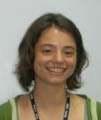
Liania Przygocki
Contact Information
Liania PrzygockiBS Student (International Agriculture and Rural Development)
College of Agriculture and Life Sciences, Cornell University
Source of Funding: National Science Foundation (NSF)
Course highlights
Helping with next steps
- Seeing a wide diversity of projects and departments has been extremely helpful for me in terms of seeing what's out there, helping me consider my options in a more informed manner.
- IRRI staff were so eager to be accessible to students, very important.
- Eugene is great!!
- Also leaving with the feeling that IRRI is accessible to me as a resource for the future. Very empowering.
Evaluation
- Everyone involved in this course is more engaged than I've ever experienced before; the commitment is amazing. Their genuine interest was a really important part of my experience as it translated in to everyone's enthusiasm.
- Gender/culture issues must be addressed. This course could be the perfect platform for changing this negative side of research and academia. I learned a lot about this when I had no idea it'd even be an issue. Inciting change in this area would be a huge contribution to the academic/research/scientific community.
- What is the screening process for applicants? Maybe re-evaluate this a bit so you're certain that those you accept are participants because they reflect the goals you've outlined.
- What an amazing resource this course has been!! Getting involvement from all, depts. was great. More hands-on stuff when there's a day devoted to a specific topic. Melissa Fitzgerald and Martin Gummert made good use of their time.
- Put "social science" stuff at beginning and don't rush it. Combined with planting of crop, this is a great backdrop for delivering in to more specific/technical areas
- Integrate the project in to the whole course with chunks of time set aside for work.
- Allow the participants time to prepare something they'll be proud of. Some other format (panel discussion, debate, teaching session by participants) could be fun.
- Internet access should be given asap so participants can get in touch with family, etc. does "internet training" need to be so long?
- Don't be afraid to generate awareness of power/culture issues at beginning to set standard of openness.
- Thanks a million to Macky for photos! Great job compiling those.
- Filipino participants were a good resource.
- Snack time is excellent
- Participants should be supplied with IRRI jeans.
- "Panel discussions" were a good way for instructors and participants to "check in" Maybe do 2 sessions at once some afternoons so participants can choose only one, allowing smaller groups and the chance to go more in-depth with areas of interest
- Course was great for stimulating my mind and has impacted my thoughts for the future
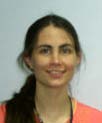
Megan O'Rourke
Contact Information
Megan O'RourkePhD Student (Ecology and Evolutionary Biology)
Department of Ecology and Evolutionary Biology, Cornell University
Source of Funding: National Science Foundation (NSF)
Course highlights
- Most outstanding point! It's been my first experience being in a developing nation and seeing the economic situation first-hand. It has been well complemented by learning the details of rice systems and thinking about how the technological ideas can serve people.
- Charting the next step? It has reminded me that I began studying agriculture because of its essential place in supporting lives and societies. I suspect that the effects of the course will be subtle as I choose between careers in academia or applied agriculture. This course makes me better appreciate the importance of applied agriculture.
Evaluation of the course
Overall, it's been better than I expected it to be. I think the project was a great idea but would have been better served by fewer evening activities. It would also help to structure the course with half days spent in lecture and half in practicum activities. I would have also appreciated a bit of information on soils and weeds.

Alisha Stivers
Contact Information
Alisha StiversMS Student (Plant Breeding)
Department of Crop, Soil, and Environmental Sciences, University of Arkansas
Source of Funding: National Science Foundation (NSF)
Course highlights
I really enjoyed participating in all aspects of this course. This may sound diplomatic but the whole experience has been extremely enlightening. I especially enjoyed the lab and field exercises. Land preparation, post harvest management, and the quality lab were the most exciting for me. I believe that this was because it filled in gaps between fully industrialized agriculture in the U.S. and how most heavy rice producing countries in the developing world raise, manage, and harvest their rice crop. The quality lab helped me understand how quality analysis is done and how important rice quality (aside from U.S. quality standards) really is.
An important take-home point for me was the connection between social issues concerning rice growers and how we as practicing scientist or future scientist can help better the lives of the millions of rice growers and consumers world-wide through innovations and collaborative efforts. The bonds that all of us in this course have formed are strong and I hope they will persist. The training center staff and participating scientist were very encouraging for all of us and our future prospects. Before ever leaving the U.S., I had an idea of wanting to work internationally, but didn't know how that could be possible. Reflecting back on the three weeks, I now know that this can be possible for me (international work). Commitment, passion, and collaboration are the take-home points from this 3-week course that will help fulfill my desire to do work internationally as a service to humanity.
Course evaluation
I am so grateful for the opportunity to come here and learn from the other participants, training staff, and IRRI scientists. I can give my evaluation briefly: exciting, exhausting at times, but even-more enriching. Nothing great can be done without hard work, dedication, and enthusiasm. I feel that we are all prepared to either continue great work or for some of us, the beginning of great work.
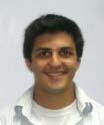
Nicholas Strutt
Contact Information
Nicholas StruttBS Student (Plant Breeding and Genetics, International Agriculture and Rural Development)
College of Agriculture and Life Sciences, Cornell University
Source of Funding: National Science Foundation (NSF)
Course highlights
Learning about the huge number of angles to rice research - it was also great learning about how crucial it is to connect all of these disciplines.
The field work was a lot of fun and I think it is important for teaching people how to think about rice from a farmer's practical perspective.
Panel discussions were really helpful for me.
Charting the future
This course actually made me very nervous about continuing research in rice. There were so many topics discussed and it makes it really tough to consider what you can do personally to make an impact on a larger scale. I think it is just an initial feeling of uncertainty that will subside in my mind. This course definitely made me interested in continuing to study rice and has presented plenty of information which will help me decide, in the future, what approach to take.
Evaluation
This was a great course that I would recommend strongly to others. It was at times tiring because of the length of days and how much material was presented, but I think that was completely necessary.
The amount of information provided outweighed being worn out. The amount of attention paid by Susan, Noel, Hei, Eugene, and others was amazing. I came out feeling like friends with all of you and it was so encouraging to have all of that support and attention throughout the 3 weeks.
The group project was a good idea, but needs to be developed a little more so as to make a stronger focus on what is the ultimate goal. Scheduled time to work on the project would also be good along with some assistance/meetings with experienced researchers.
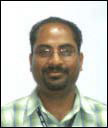
Sheshu M. Madhav
Contact Information
Sheshu M. MadhavScientist
Molecular Biology & Biotechnology Directorate of Rice Research
Source of Funding: GATSBY Charitable Foundation
Course highlights
Co-ordination and overall management of course is excellent. Course covered all most of the aspects of rice production and exposed me to various issues/challenges of rice research. Exposure to the issues of germplasm exchange and property rights was also commendable. Course tried at best to give practical knowledge of some topics on rice production and breeding. Special discussion forum really helped a lot in knowing recent developments and trends in particular area.
Outstanding point learned
The challenges of global climate change and its relationship to rice production. Course helped in thinking about new strategies and means to answer some of the old problems like in biotic stresses and abiotic stresses. The project at the end made me really use the information gained from the training.
Course Evaluation
- Course is excellent in co-ordination
- Covered all most all areas of rice production
- Content is well planned
- Sessions on quality, water management, IPM and genomics are fairly good
- Panel discussions are useful
- Power lunch discussions are also useful
- Exposure to activities of IRRI developed is needed
- The session on high end technologies could have been included
- The session on testing of transgenics and pest management may be extended
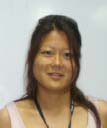
Sabine Mameau
Contact Information
Sabine MameauPhD Student
Department of Plant Sciences, University of Cambridge
Source of Funding: GATSBY Charitable Foundation
Course highlights
What was most outstanding point you learned; how has the course helped/not helped you in charting your next steps; and evaluation of the course As I had a very limited background on rice/cereal production, overall, every subject was relevant to me in broadening my knowledge/understanding. It surely sounds very general but I do think every part was interesting even though water management, rice post-harvest management for example were not directly relevant to what I'm doing presently (PhD in wheat genetics).
I really enjoyed the entire practical as first experiences, these were very interactive and it was very cool we all got to practice inidually. On a different side, I very much appreciated the enthusiasm and informal/relaxed attitude from the organizers which reached all participants and got us to interact with each other with more confidence. I found the course very complete and personally helped me in widening my views for a future career. The aspects of social science really directed me in the vision that I may want to switch from molecular biology to more social applications of science. It was great to find out there are big opportunities/a lot in place in that field which may correspond better to me rather than lab research.
I also liked a lot the group project, even though we might have wished for a little bit more time. It was very enriching on both work and social sides. It was definitely a positive thing to mix cultures and backgrounds. Additionally, forums definitely raised very good points of discussion and reflection which is something I miss a lot in UK, in my "lonely" project (!) which is probably a reason why I had difficulties to talk in public. To conclude, I would say I really enjoyed the range of topics and varied activities but it would have been great if speakers had been audible by everyone or field visits/greenhouses (microphone please! People a bit further could not hear what was said.

Zoe Rutterford
Contact Information
Zoe RutterfordPhD Student
Department of Plant Sciences, University of Cambridge
Source of Funding: GATSBY Charitable Foundation
Course highlights
- Active involvement in land, harvest and lab work, whilst simultaneously interacting with and learning from leaders of rice research production
- It has been inspiring to join a group of scientific contemporaries and senior professionals, who (despite originating from hugely erse range of backgrounds) have so much in common. It's like being in a boiling point of novel ideas and different opinions.
My next steps
I feel that this course has restored my interest in pursuing a career in development and agricultural research. It has also provided me with the perfect opportunity to form, and establish some priceless links (with both academic and social foundations!)
Evaluation
- Earlier and wider advertising of the course to potential applicants would enhance the depth in cultural diversity.
- Possibly the length of the course could be extended to 4 weeks in order to allow participants to absorb more and consolidate their group project work fully.
- It would help to attract more undergraduates if the course timing coincides with U.S. and European University vacations.
- Meeting/interviewing local farmers is extremely important; as is the process of working on projects in mixed groups. Both experiences may be the first chance participants have to work "in development" so it's great that there is guidance/supervision available from the experts!
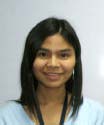
Suthasinee Somyang
Contact Information
Suthasinee SomyangPhD Student (Plant Breeding and Genetics)
Small Grain Laboratory Department of Plant Breeding, Cornell University
Source of Funding: GATSBY Charitable Foundation
Course highlights
What was most outstanding point I learned? There are many points that I learned a lot from rice production training course in terms of social activity, rice research knowledge. The knowledge I like most is to make myself know the value of rice before it is on my dish to eat. There are many steps involved; land preparation, crop establishment, water management, rice post-harvest management.
However, in order to have good quality rice and healthy rice plants there are many aspects involved; plant breeding, abiotic and biotic resistance, nutrient management, genomics, pest management and seed quality. In addition, social science such as Rice Knowledge Bank is more important. I cannot think which topics could eliminate but itseems like we should have more, such as rice economic, social science and other social thinking such as why new generation don't want to work in the agriculture - how are we going to solve that problem.
It seems the schedule that we have is so tight, but it is a challenge to learn them. One more topic that I think that we can help participants feel relieve from sitting the classroom only is setting the schedule lecture in the morning and field work or lab work in the afternoon.
This course helped me to learn a lot not only in detail but also idea. For example, in order to be successful in your career and solve the problems, we should not work alone. We should connect between erse expertise. After I graduate, I will be a researcher in plant field. I will use all the knowledge, and connections to person/people to help improve my country, and my community as well.

Konstantina Stamati
Contact Information
Konstantina StamatiCenter for Plant Genetics, Breeding, and Evaluation
National Institute of Agricultural Botany, United Kingdom
Source of Funding: GATSBY Charitable Foundation
This course brought together a very interesting group of people and I feel that this course is an investment in our future.
Course highlights
I wouldn't want to pick one point only as the most outstanding. The course was very erse covering important topics relevant to both developing and developed nations. The exposure to land preparation, planting of rice and talking to local farmers enabled me to get a better understanding of the real needs that these people have. For me it has been an eye opener experience.
Additionally, getting the opportunity to interact with participants from such a erse social and professional background was very interesting and enjoyable. We were very lucky, because most of us were able to form very good relationships. I will miss waking up very early (5 a.m.) and going outside to bind Myron and Alisha to have one of our stimulating conversations about science and our countries.
This course presented what is available and what it may help in the future. Scientists have been working for many years and have accumulated lots of data and being able to distribute these to the farmers is under progress. However, policy is something that needs a lot of attention and this is where I would like to be involved. I feel that this course re-enforced my beliefs and made me aware of people that I could contact and exchange thoughts in the future.
Evaluation of the course
- The course covered all important aspects related to rice production and research issues.
- The time that the course was spread, I felt that was sufficient for the amount of material taught.
- The interactive lectures were very important and helped people, not as confident, to be able to interact.
- I would suggest that the power lunches could be integrated in the original time table; this will decrease confusion of when topic is discussed.
- I understand that the first day was free due to elections and not in the organizer's control, however through discussions with other members of thi group, it sounded that it may be better to do the administrative side of the course in the first day and if possible in a more compact way. Maybe if a little explains everything about accommodation is enough to cover accommodation issues.
- The discussion and the easy access to the IRRI scientists as well as to the organizers of this course made us feel that we were getting valuable experience, information and ideas difficult to get outside a course.
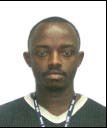
Jean-Pierre Kayiranga
Contact Information
Jean-Pierre KayirangaRice Research Assistant and Program Representative for the North Eastern Region of Rwanda
Rwanda Agricultural Research Institute (ISAR)
Source of Funding: Rwanda Agricultural Research Institute (ISAR)
Most outstanding points for this course
- To know how to do emasculation and breeding of rice
- To understand how to structure effective international collaborations
- Rice post-harvest management
- Integrated pest management
- Variety selection
- An introduction to genomics and its application through the knowledge it gave me for my country and my institution
Course evaluation
The course was good prepared, interesting for me. But it was short if I compare with its program.
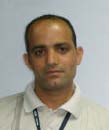
Saber El-Sayed Sedeek
Contact Information
Saber El-Sayed SedeekResearcher/Breeder Rice Research and Training Center
Source of Funding: Afro-Asian Rural Development Organization (AARDO)
Course Highlights
Highlight of the course included rice growing environments, variety selection, land preparation, water management, grain quality and measuring the aroma character by new method such gas chromatography, panicle emasculation and breeding for submergence especially under rainfed conditions. Also, study the physiological breeding for drought and salinity tolerance then testing seed health. The most interesting topic in this course is physiology and breeding for salinity and drought tolerance.
The training course helped me how we can measure the aroma character, it's very necessary for me. Also, the new methods for breeding for salinity and drought tolerance.
Course evaluation
The course is very useful for understanding the basics of rice production and skills development relating to rice breeding, molecular genetic and genomics. The course needs to be for longer, two months at least.
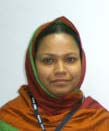
Rokeya Begum
Contact Information
Rokeya BegumResearch Associate
Plant Biotechnology Laboratory Departments of Biochemistry and Molecular Biology, University of Dhaka
Source of Funding: International Rice Research Institute (Generation Challenge Program (GCP) Project 2)
Course Highlights
- Firstly: I want to say that's course which one I am learn at first from this training and also interested about:
- Long term trends in rice demand and supply
- Rice growing environments
- Variety selection
- Quality - the true test of rice
- Rice post-harvest management and markets
- Integrated N2 managements
- Panicle emasculation and modern rice breeding
- The Rice Knowledge Bank and farmers' access to knowledge
- Seed health testing
I want the time extended for this course because this course is first for me; for this reason I had some difficulty to understand everything in short time. If time extend, it may help to understand.
I am also interested about the topic "Introduction to genomics and its application." I learn more about this from course presentation and for "abiotic stress" during the power lunch. I want to see its practical application. I think field practicum about (1) land preparation; (2) water management is not necessary. It may be more helpful if give us more technical learning about this method. It may be more effective in my country. I can teach our farmer.
Power lunch discussion is very good. By this we can discuss directly with expertise.
Secondly: My study background is Biochemistry and Molecular Biology. Now I am working at molecular level. I have no idea about rice field or farmers. By this training, I introduce in rice field and we get interview a farmer and know about their livelihood. It is very good. I think, some activities such as land preparation, water management is exciting but not applicable. If I get a more knowledge, this is more helpful. I think this training program schedule time extend from 3 weeks to 5 weeks because many thing we learn newly, if teach more time, then understand clear and more. Project writing and presentation is more exciting to me. I think, it is a more effective training. It is good. If time extend, it may be better.
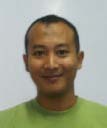
Toto Hadiarto
Contact Information
Toto HadiartoResearcher
Molecular Biology Division Indonesian Centre for Agricultural Biotechnology and Genetic Resources and Development
Source of Funding: International Rice Research Institute (Generation Challenge Program (GCP) Project 2)
Course Highlights
To decide the most outstanding point I learned in this course is not easy. Most (if not all) of them are excellent. To me, it is either the "hands on" exercises or the applications of science to help improve conditions in the world.
The course also helped me to meet and interact with scientists and students around the world. This will be a good opportunity to build network so that we can work together, hopefully, solving the world's problems.
The course is excellent. Most of the subjects were presented professionally by expert scientists in their specialty. The "hands on" exercises are very good in helping me to understand more about the subjects. "Power lunch" was not as helpful as I thought it would be. I think it is due to limited time(about 40 min) for discussion. Project proposal was fun and excellent. We were learning to work with others, how to respect others' ideas, how to combine ideas and how to make good proposal. Several dinners and the trip (staying at the beach) were also exciting and enjoyable.
It would be better to have articles to read before lectures so that it's easier to learn. With CD collection of photograph, the course delivered more than what I expected.
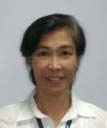
Celsa A. Quimio
Contact Information
Celsa A. QuimioAssistant Professor and Plant Breeder
Crop Science Cluster College of Agriculture, University of the Philippines Los Banos
Source of Funding: International Rice Research Institute
Course Highlights
The course tackled practically all aspects of rice production from "seed to plant to seed". It also included the current research undertakings going on at IRRI, their finding and global impact. Very important also were the discussions on current and future issues to address which may serve as guide to where rice research should be heading. One very important point I learned from the course, in my own perspective (as a member of the academe), is the need/necessity of forgoing stranger partnerships between IRRI and UPLB. Such partnership is unique and specific because of proximity of the two in terms of locations. Though IRRI and UPLB has had long and fruitful collaboration through conduct of student research in IRRI, there had been very limited involvement of teaching staff in IRRI's research activities. This might probably be one area where IRRI-UPLB partnerships could be strengthened in order to produce highly competent students also will be the future rice scientists in the region. This would be applicable when appropriate and in case to case basis.
Evaluation of the course
The course was excellent! I have learned so much from the course. I may have worked on rice for a number of years already but I only focused on a certain/particular aspect. Aspects on rice outside of my specialization were not familiar to me and so the course helped me a lot. The topics covered and the duration of the course was just right. I cannot find any weakness in the course that necessitates improvement.
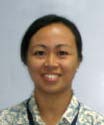
Anna Theresa Isabel O. Rebong
Contact Information
Anna Theresa Isabel O. RebongScience Research Specialist II
PhilRice Isabela
Source of Funding: International Rice Research Institute
Outstanding points
One of the most interesting parts for me in this course is the hands-on experiences I had from land preparation, crop establishment to post-harvest production. Along with the lectures, these experiences gave me insights on new technologies available for farmers and researchers like me and how easily this technology could be disseminated. The lectures we had, power lunches and snacks, encouraged exchanges of ideas which enabled me or challenged me to be more creative in making better proposals and explore other areas for rice research. The two experiences given by Rokeya and Anna and Ryan and Toto was an eye-opener on the actual situations experienced in other developing countries in their rice production. Meeting people from different backgrounds of science and research encouraged exchange of ideas which I think would help me interact better with farmers in our area.
Course evaluation
Interactive lectures were interesting, thoughat times they could be boring, more so when the speaker has so many slides which are a bit hard to understand (Bioinformatics, Climate change). Field practicum were scheduled a bit late in the mornings and afternoons when the sun was too hot (conditions not too conducive for planting), maybe they could be done earlier or early mornings with the lectures a day before the actual practicum.
All in all, the course was alright and very interesting, and the discussions or forums were challenging. Farmer's field visit was a bit disappointing to me because I was expecting farmer's who were poor and wanted the experience to be a challenge for me to do better to help them.
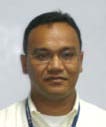
Raul Boncodin
Contact Information
Raul BoncodinAssistant Manager II, Intellectual Property Management Unit
International Rice Research Institute
Source of Funding: International Rice Research Institute
Course Highlights:
- The fieldwork, as it provided hands-on experience of rice production. This provided a more lasting impression of what rice is all about.
- The farmer's visit - interacting with a person who actually lives and breathes with rice put into perspective the high words and complex science covered in the last 3-weeks.
- The interaction with young, intelligent, multi-cultural group of participants - this highlighted the importance of rice, not only for Asians but for the whole mankind.
How the course helped me
I just joined IRRI and have little knowledge about rice production as I have worked on other crops in the past. This course gave me a lot of knowledge on rice. The interaction with other participants also made me appreciate more my work at IRRI, as I realized that there are a lot of people, even non-rice eaters, very interested in rice. I am a rice-eater and I should work more to make it more available, affordable and beneficial to those eating it.

Ippei Ogawa
Contact Information
Ippei OgawaMS Student
Department of Global Agricultural Sciences, The University of Tokyo
Source of Funding: International Rice Research Institute (Harvest Plus Project)
Course Highlights:
Emasculating and breeding were the most interesting activities for me. Although it is a basic technique for rice research, I have not experienced it so far. I will not have a chance to do this in my area of research as I use only molecular biological techniques in my lab.
I could learn in this course that there are many varieties of rice which have diverse characters. Therefore, it comes to in my mind that breeding is useful as well as molecular technique.
Course evaluation
I think the course was very well organized in sense of quality and quantity. But because of the lack of my English skill, I sometimes could not understand some people. This was my first time where I can use only English. So it was a big experience for me not only for training of rice, but also for attending an international community.
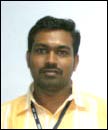
Sadhasivam Viswanathan
Contact Information
Sadhasivam ViswanathanPhD Student
Plant Molecular Biology Laboratory, M S Swaminathan Research Foundation
Source of Funding: International Rice Research Institute (Harvest Plus Project)
Course Highlights:
- Course has covered almost all parts of rice production - from field preparation to post-harvest technologies and hard core science such as genetics and molecular genomics behind the rice research.
- Co-ordination and time management during the sessions are outstanding. Special credit to Engineer Eugene Castro, Jr. and all other training committee members.
- The system of "power lunch" was most useful session as each person coming to IRRI (apart from the regular training) would like to discuss their work and areas of interest;
- Abiotic stress studies helped me to design experiments for my future studies.
- The system of exposure to the exact environment apart from the theoretical lecture is very useful. Especially the visit to different fields of mapping population and different abiotic stress treatments in the phytotron, post-harvest work, seed quality testing, etc.
- System of leisure during the weekends is also interesting.
